- Home
- Philip Roth
Nemesis Page 3
Nemesis Read online
Page 3
"I have to get off the phone," Marcia said. "There's somebody waiting behind me. Please take care of yourself."
"I do. I will. But don't worry. Don't be frightened. There's nothing to be frightened about."
The next day, news raced through the community that within the Weequahic school district there were eleven new cases of polio--as many as had been reported there in the previous three years combined, and it was still only July, with a good two months to go before the polio season was over. Eleven new cases, and during the night Alan Michaels, Mr. Cantor's favorite, had died. The disease had finished him off in seventy-two hours.
The day following was Saturday, and the playground was open to organized activities only until noon, when the rising and falling whine of the air-raid sirens sounded in their weekly test from utility poles across the city. Instead of going back to Barclay Street after closing up, to help his grandmother with the week's grocery shopping--the stock of their own grocery store had been sold for a pittance after his grandfather's death--he showered in the boys' locker room and put on a clean shirt and trousers and a pair of polished shoes that he'd brought with him in a paper bag. Then he walked the length of Chancellor Avenue, all the way down the hill to Fabyan Place, where Alan Michaels's family lived. Despite polio's striking in the neighborhood, the store-lined main street was full of people out doing their Saturday grocery shopping and picking up their dry-cleaning and their drug prescriptions and whatever they needed from the electrical shop and the ladies' wear shop and the optical shop and the hardware store. In Frenchy's barber shop every seat was occupied by one of the neighborhood men waiting to get a haircut or a shave; in the shoe repair shop next door, the Italian shopkeeper--the street's only non-Jewish shop owner, not excluding Frenchy--was busy finding people's finished shoes in a pile of them on his cluttered counter while the Italian radio station blared through his open doorway. Already the stores had their front awnings rolled down to keep the sun from beaming hotly through the plate-glass window looking onto the street.
It was a bright, cloudless day and the temperature was rising by the hour. Boys from his gym classes and from the playground became excited when they spotted him out on Chancellor Avenue--since he lived not in the neighborhood but down in the South Side school district, they were used to seeing him only in his official capacities as gym teacher and playground director. He waved when they called "Mr. Cantor!" and he smiled and nodded at their parents, some of whom he recognized from PTA meetings. One of the fathers stopped to talk to him. "I want to shake your hand, young man," he said to Mr. Cantor. "You told those dagos where to get off. Those dirty dogs. One against ten. You're a brave young man." "Thank you, sir." "I'm Murray Rosenfield. I'm Joey's father." "Thank you, Mr. Rosenfield." Next, a woman who was out shopping stopped to speak to him. She smiled politely and said, "I'm Mrs. Lewy. I'm Bernie's mother. My son worships you, Mr. Cantor. But I have one thing to ask you. With what's going on in the city, do you think the boys should be running around in heat like this? Bernie comes home soaked to the skin. Is that a good idea? Look at what's happened to Alan. How does a family recover from something like this? His two brothers away in the war, and now this." "I don't let the boys overexert themselves, Mrs. Lewy. I watch out for them." "Bernie," she said, "doesn't know when to quit. He can run all day and all night if somebody doesn't stop him." "I'll be sure to stop him if he gets too hot. I'll keep my eye on him." "Oh, thank you, thank you. Everybody is very happy that it's you who's looking after the boys." "I hope I'm helping," Mr. Cantor replied. A small crowd had gathered while he'd been talking to Bernie's mother, and now a second woman approached and reached for his sleeve to get his attention. "And where's the Board of Health in all this?" "Are you asking me?" Mr. Cantor said. "Yes, you. Eleven new cases in the Weequahic section overnight! One child dead! I want to know what the Board of Health is doing to protect our children." "I don't work for the Board of Health," he replied. "I'm playground director at Chancellor." "Somebody said you were with the Board of Health," she charged him. "No, I'm not. I wish I could help you but I'm attached to the schools." "You dial the Board of Health," she said, "and you get a busy signal. I think they purposely leave the phone off the hook." "The Board of Health was here," another woman put in. "I saw them. They put a quarantine sign up on a house on my street." Her voice full of distress, she said, "There's a case of polio on my street!" "And the Board of Health does nothing!" someone else said angrily. "What is the city doing to stop this? Nothing!" "There's got to be something to do--but they're not doing it!" "They should inspect the milk that kids drink--polio comes from dirty cows and their infected milk." "No," said someone else, "it isn't the cows--it's the bottles. They don't sterilize those milk bottles right." "Why don't they fumigate?" another voice said. "Why don't they use disinfectant? Disinfect everything." "Why don't they do like they did when I was a child? They tied camphor balls around our necks. They had something that stunk bad they used to call asafetida--maybe that would work now." "Why don't they spread some kind of chemical on the streets and kill it that way?" "Forget about chemicals," someone else said. "The most important thing is for the children to wash their hands. Constantly wash their hands. Cleanliness! Cleanliness is the only cure!" "And another important thing," Mr. Cantor put in, "is for all of you to calm down and not lose your self-control and panic. And not communicate panic to the children. The important thing is to keep everything in their lives as normal as possible and for you all, in what you say to them, to try to stay reasonable and calm." "Wouldn't it be better if they stayed home till this passes over?" another woman said to him. "Isn't home the safest place in a crisis like this? I'm Richie Tulin's mother. Richie is crazy about you, Mr. Cantor. All the boys are. But wouldn't Richie be better off, wouldn't all the boys be better off, if you closed down the playground and they stayed at home?" "Shutting down the playground isn't up to me, Mrs. Tulin. That would be up to the superintendent of schools." "Don't think I'm blaming you for what's happening," she said. "No, no, I know you're not. You're a mother. You're concerned. I understand everyone's concern." "Our Jewish children are our riches," someone said. "Why is it attacking our beautiful Jewish children?" "I'm not a doctor. I'm not a scientist. I don't know why it attacks who it attacks. I don't believe that anyone does. That's why everybody tries to find who or what is guilty. They try to figure out what's responsible so they can eliminate it." "But what about the Italians? It had to be the Italians!" "No, no, I don't think so. I was there when the Italians came. They had no contact with the children. It was not the Italians. Look, you mustn't be eaten up with worry and you mustn't be eaten up with fear. What's important is not to infect the children with the germ of fear. We'll come through this, believe me. We'll all do our bit and stay calm and do everything we can to protect the children, and we'll all come through this together," he said. "Oh, thank you, young man. You're a splendid young man." "I have to be going, you'll have to excuse me," he told them all, looking one last time into their anxious eyes, beseeching him as though he were something far more powerful than a playground director twenty-three years old.
FABYAN PLACE was the last street in Newark before the railroad tracks and the lumberyards and the border with Irvington. Like the other residential streets that branched off Chancellor, it was lined with two-and-a-half-story frame houses fronted by red-brick stoops and hedged-in tiny yards and separated from one another by narrow cement driveways and small garages. At the curb in front of each stoop was a young shade tree planted in the last decade by the city and looking parched now after weeks of torrid temperatures and no rain. Nothing about the clean and quiet street gave evidence of unhealthiness or infection. In every house on every floor either the shades were pulled or the drapes drawn to keep out the ferocious heat. There was no one to be seen anywhere, and Mr. Cantor wondered if it was because of the heat or because the neighbors were keeping their children indoors out of respect for the Michaels family--or perhaps out of terror of the Michaels family.
The
n a figure emerged from around the Lyons Avenue corner, making its solitary way through the brilliant light burning down on Fabyan Place and already softening the asphalt street. Mr. Cantor recognized who it was, even from afar, by the peculiar walk. It was Horace. Every man, woman, and child in the Weequahic section recognized Horace, largely because it was always so disquieting to find him heading one's way. When the smaller children saw him they ran to the other side of the street; when adults saw him they lowered their eyes. Horace was the neighborhood's "moron," a skinny man in his thirties or forties--no one knew his age for sure--whose mental development had stopped at around six and whom a psychologist would likely have categorized as an imbecile, or even an idiot, rather than the moron he'd been unclinically dubbed years before by the neighborhood youngsters. He dragged his feet beneath him, and his head, jutting forward from his neck like a turtle's, bobbed loosely with each step, so that altogether he appeared to be not so much walking as staggering forward. Spittle gathered at the corners of his mouth on the rare occasions when he spoke, and when he was silent he would sometimes drool. He had a thin, irregular face that looked as if it had been crushed and twisted in the vise of the birth canal, except for his nose, which was big and, given the narrowness of his face, oddly and grotesquely bulbous, and which inspired some of the kids to taunt him by shouting "Hey, bugle nose!" when he shuffled by the stoop or the driveway where they were congregated. His clothing gave off a sour smell regardless of the season, and his face was dotted with blood spots, tiny nicks in his skin certifying that though Horace might have the mind of a baby, he also had the beard of a man and, however hazardously, shaved himself, or was shaved by one of his parents, before he went out every day. Minutes earlier he must have left the little apartment back of the tailor shop around the corner where he lived with his parents, an aged couple who spoke Yiddish to each other and heavily accented English to the customers in the shop and were said to have other, normal children who were grown and lived elsewhere--amazingly enough, one of Horace's two brothers was said to be a doctor and the other a successful businessman. Horace was the family's youngest, and he was out walking the neighborhood streets every day of the year, in the worst of summer as in the worst of winter, when he wore an oversized mackinaw with its hood pulled up over his earmuffs and black galoshes with the toggles undone and mittens for his large hands that were attached to the cuffs of his sleeves with safety pins and that dangled there unused no matter what the temperature. It was an outfit in which, trudging along, he looked even more outlandish than he did ordinarily making the rounds of the neighborhood alone.
Mr. Cantor found the Michaels house on the far side of the street, climbed the stoop steps, and, in the small hallway with the mailboxes, pushed the bell to their second-floor flat and heard it ringing upstairs. Slowly someone descended the interior stairs and opened the frosted glass door at the foot of the stairwell. The man who stood there was large and heavyset, and the buttons on his short-sleeved shirt pulled tightly across his belly. He had grainy dark patches under his eyes, and when he saw Mr. Cantor he was silent, as though grief had left him too stupefied to speak.
"I'm Bucky Cantor. I'm the playground director at Chancellor and a phys ed teacher there. Alan was in one of my gym classes. He was one of the boys who played ball up at the playground. I heard what happened and came to offer my condolences."
The man was a long time answering. "Alan talked about you," he finally said.
"Alan was a natural athlete. Alan was a very thoughtful boy. This is terrible, shocking news. It's incomprehensible. I came to tell you how upset I am for all of you."
It was very hot in the hallway, and both the men were perspiring heavily.
"Come upstairs," Mr. Michaels said. "We'll give you something cold."
"I don't want to bother you," Mr. Cantor replied. "I wanted to express my condolences and tell you what a fine boy you had for a son. He was a grownup in every way."
"There's iced tea. My sister-in-law made some. We had to call the doctor for my wife. She's been in bed since it happened. They had to give her pheno-barb. Come and have some iced tea."
"I don't want to intrude."
"Come. Alan told us all about Mr. Cantor and his muscles. He loved the playground." Then, his voice breaking, he said, "He loved life."
Mr. Cantor followed the large, grief-stricken man up the stairs and into the flat. All the shades were lowered and no lights were on. There was a console radio beside the sofa and two big soft club chairs opposite that. Mr. Cantor sat on the sofa while Mr. Michaels went to the kitchen and returned with a glass of iced tea for the guest. He motioned for Mr. Cantor to sit closer to him in one of the club chairs and then, sighing audibly, painfully, he sat in the other chair, which had an ottoman at its foot. Once he was stretched out across the ottoman and the chair, he looked as though he too, like his wife, were in bed, drugged and incapable of moving. Shock had rendered his face expressionless. In the near darkness, the stained skin beneath his eyes looked black, as if it had been imprinted in ink with twin symbols of mourning. Ancient Jewish death rites call for the rending of one's garments on learning of the death of a loved one--M Michaels had affixed two dark patches to his colorless face instead.
"We have sons in the army," he said, speaking softly so no one in another room could hear, and slowly, as if out of great fatigue. "Ever since they've been overseas, not a day has gone by when I haven't expected to hear the worst. So far they have survived the worst fighting, and yet their baby brother wakes up a few mornings back with a stiff neck and a high fever, and three days later he's gone. How are we going to tell his brothers? How are we going to write this to them in combat? A twelve-year-old youngster, the best boy you could want, and he's gone. The first night he was so miserable that in the morning I thought that maybe the worst was over and the crisis had passed. But the worst had only begun. What a day that boy put in! The child was on fire. You read the thermometer and you couldn't believe it--a temperature of a hundred and six! As soon as the doctor came he immediately called the ambulance, and at the hospital they whisked him away from us--and that was it. We never saw our son alive again. He died all alone. No chance to say so much as goodbye. All we have of him is a closet with his clothes and his schoolbooks and his sports things, and there, over there, his fish."
For the first time, Mr. Cantor noticed the large glass aquarium up against the far wall, where not only were the shades drawn but dark drapes were pulled shut across a window that must have faced the driveway and the house next door. A neon light shone down on the tank, and inside he could see the population of tiny, many-hued fish, more than a dozen of them, either vanishing into a miniature grotto, green with miniature shrubbery, or sweeping the sandy bottom for food, or veering upward to suck at the surface, or just suspended stock-still near a silver cylinder bubbling air in one corner of the tank. Alan's handiwork, Mr. Cantor thought, a neatly outfitted habitat fastidiously managed and cared for.
"This morning," Mr. Michaels said, gesturing back over his shoulder at the tank, "I remembered to feed them. I jumped up in bed and remembered."
"He was the best boy," Mr. Cantor said, leaning across the chair so he could be heard while keeping his voice low.
"Always did his schoolwork," Mr. Michaels said. "Always helped his mother. Not a selfish bone in his body. Was going to begin in September to prepare for his bar mitzvah. Polite. Neat. Wrote each of his brothers V-mail letters every single week, letters full of news that he read to us at the dinner table. Always cheering his mother up when she would get down in the dumps about the two older boys. Always making her laugh. Even when he was a small boy you could have a good time laughing with Alan. Our house was where all their friends came to have a good time. The place was always full of boys. Why did Alan get polio? Why did he have to get sick and die?"
Mr. Cantor clutched the cold glass of iced tea in his hand without drinking from it, without even realizing he was holding it.
"All his friends are terrif
ied," Mr. Michaels said. "They're terrified that they caught it from him and now they are going to get polio too. Their parents are hysterical. Nobody knows what to do. What is there to do? What should we have done? I rack my brain. Can there be a cleaner household than this one? Can there be a woman who keeps a more spotless house than my wife? Could there be a mother more attentive to her children's welfare? Could there be a boy who looked after his room and his clothes and himself any better than Alan did? Everything he did, he did it right the first time. And always happy. Always with a joke. So why did he die? Where is the fairness in that?"
"There is none," Mr. Cantor said.
"You do only the right thing, the right thing and the right thing and the right thing, going back all the way. You try to be a thoughtful person, a reasonable person, an accommodating person, and then this happens. Where is the sense in life?"
"It doesn't seem to have any," Mr. Cantor answered.
"Where are the scales of justice?" the poor man asked.
"I don't know, Mr. Michaels."
"Why does tragedy always strike down the people who least deserve it?"
"I don't know the answer," Mr. Cantor replied.
"Why not me instead of him?"
Mr. Cantor had no response at all to such a question. He could only shrug.
"A boy--tragedy strikes a boy. The cruelty of it!" Mr. Michaels said, pounding the arm of his chair with his open hand. "The meaninglessness of it! A terrible disease drops from the sky and somebody is dead overnight. A child, no less!"
Mr. Cantor wished that he knew a single word to utter that would alleviate, if only for a moment, the father's anguished suffering. But all he could do was nod his head.

 American Pastoral
American Pastoral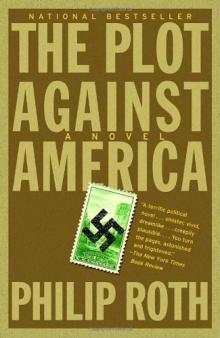 The plot against America
The plot against America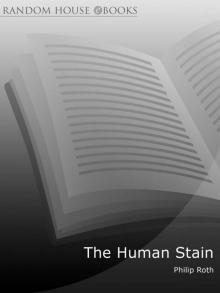 The Human Stain
The Human Stain Nemesis n-4
Nemesis n-4 Sabbath’s Theater
Sabbath’s Theater The Professor of Desire
The Professor of Desire Our Gang
Our Gang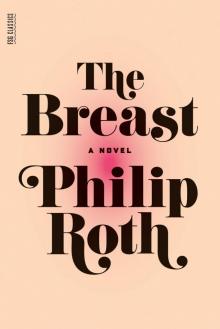 The Breast
The Breast Operation Shylock
Operation Shylock The Dying Animal
The Dying Animal Letting Go
Letting Go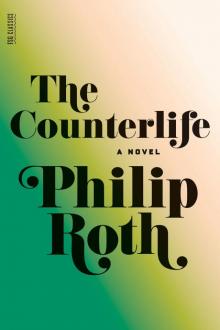 The Counterlife
The Counterlife Everyman
Everyman Nemesis
Nemesis Exit Ghost
Exit Ghost Portnoy's Complaint
Portnoy's Complaint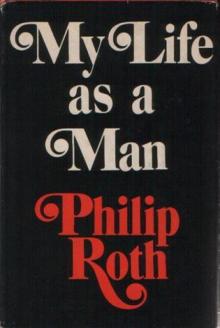 My Life as a Man
My Life as a Man I Married a Communist
I Married a Communist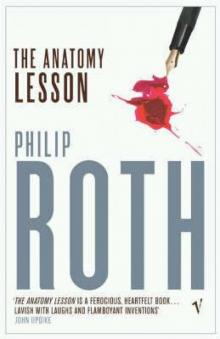 The Anatomy Lesson
The Anatomy Lesson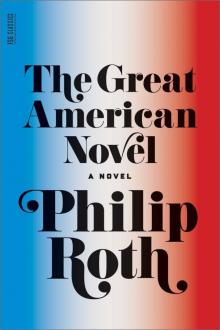 The Great American Novel
The Great American Novel Shop Talk
Shop Talk The Humbling
The Humbling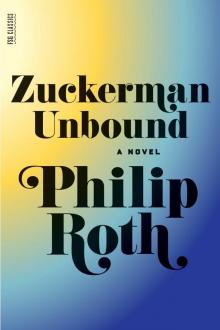 Zuckerman Unbound
Zuckerman Unbound When She Was Good
When She Was Good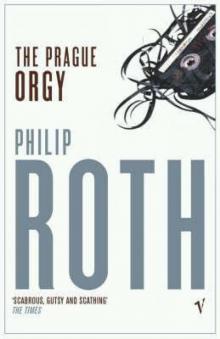 The Prague Orgy
The Prague Orgy American Pastoral (Nathan Zuckerman)
American Pastoral (Nathan Zuckerman) Goodbye, Columbus
Goodbye, Columbus Reading Myself and Others
Reading Myself and Others